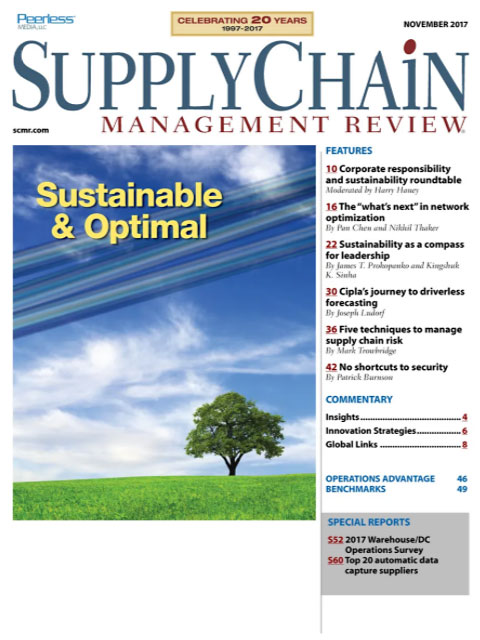Sorry, but your login has failed. Please recheck your login information and resubmit. If your subscription has expired, renew here.
November 2017
There are strands of sustainability and corporate responsibility through much of this month’s issue. James T. Prokopanko, the former CEO and president of The Mosaic Company, details how corporate responsibility became his compass for leader ship when he took over the reins of the company back in 2007. Similarly, Joseph Ludorf, the executive director of supply chain for Cipla Medpro, details how revamping the planning process enables the South African pharmaceutical company to prof- itably supply drugs to underserved populations on the continent as part of its corporate mission. We round out the issue with five tips for intelli- gent risk taking in… Browse this issue archive.Need Help? Contact customer service 847-559-7581 More options
The World Trade Organization (WTO) has just produced this year’s annual report addressing “Trade, Technology, and Jobs.” As one might expect, tracking all three trends is no easy task, especially when seeking solutions to global supply chain challenges. “The evidence collected in the report suggests that success in facilitating adjustment involves finding an appropriate balance between labor market flexibility and employment security,” says Roberto Azevêdo, the WTO’s director general. “While there is a range of approaches, and different policies will be appropriate in different circumstances, the core elements tend to include steps to facilitate labor adjustment and ensure that the benefits of economic progress are spread more widely.”
The upcoming wave of technological advances, in particular artificial intelligence and robotics, raises a number of issues, including their impact on the future of jobs.
Some experts argue that history will repeat itself and the next wave of technological advances will replace many existing jobs but create new ones. Other experts disagree, arguing that the new wave of technologies is without precedent (in terms of speed, scale and force) and will replace human jobs at a massive scale, leading to a “jobless future.”

This complete article is available to subscribers only.
Log in now for full access or start your PLUS+ subscription for instant access.
SC
MR
Sorry, but your login has failed. Please recheck your login information and resubmit. If your subscription has expired, renew here.
November 2017
There are strands of sustainability and corporate responsibility through much of this month’s issue. James T. Prokopanko, the former CEO and president of The Mosaic Company, details how corporate responsibility… Browse this issue archive. Download a PDF file of the November 2017 issue.The World Trade Organization (WTO) has just produced this year's annual report addressing “Trade, Technology, and Jobs.” As one might expect, tracking all three trends is no easy task, especially when seeking solutions to global supply chain challenges. “The evidence collected in the report suggests that success in facilitating adjustment involves finding an appropriate balance between labor market flexibility and employment security,” says Roberto Azevêdo, the WTO's director general. “While there is a range of approaches, and different policies will be appropriate in different circumstances, the core elements tend to include steps to facilitate labor adjustment and ensure that the benefits of economic progress are spread more widely.”
The upcoming wave of technological advances, in particular artificial intelligence and robotics, raises a number of issues, including their impact on the future of jobs.
Some experts argue that history will repeat itself and the next wave of technological advances will replace many existing jobs but create new ones. Other experts disagree, arguing that the new wave of technologies is without precedent (in terms of speed, scale and force) and will replace human jobs at a massive scale, leading to a “jobless future.”
 SUBSCRIBERS: Click here to download PDF of the full article.
SUBSCRIBERS: Click here to download PDF of the full article.
SC
MR


Latest Supply Chain News
- Israel, Ukraine aid package to increase pressure on aerospace and defense supply chains
- How CPG brands can deliver on supplier diversity promises
- How S&OP provides the answer to in-demand products
- AI, virtual reality is bringing experiential learning into the modern age
- Humanoid robots’ place in an intralogistics smart robot strategy
- More News
Latest Podcast

 Explore
Explore
Procurement & Sourcing News
- Israel, Ukraine aid package to increase pressure on aerospace and defense supply chains
- How CPG brands can deliver on supplier diversity promises
- How S&OP provides the answer to in-demand products
- There is still work to do to achieve supply chain stability
- Blooming success: The vital role of S&OE in nurturing global supply chains
- How one small part held up shipments of thousands of autos
- More Procurement & Sourcing
Latest Procurement & Sourcing Resources

Subscribe

Supply Chain Management Review delivers the best industry content.

Editors’ Picks






